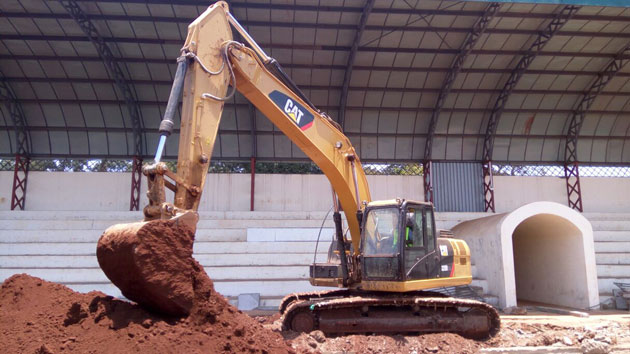The Kenya Association of manufacturers (KAM) recently announced that the ongoing political tension after elections annulment was badly hurting the economy.
In particular, KAM said that the real estate sector was experiencing a major slowdown greatly affecting steel and cement business.
These concerns are not far-fetched. Early this week the developers of a major mall in Kenya announced that they had decided to push the opening date of the mall due to heightened political tension in the country.
Kiambu mall,a Sh800 shopping complex was supposed to be opened in August but postponed to December.
“Political uncertainty in the country has slowed down shipment of construction materials so we have decided to push the opening date of the mall to December,” said Mugaa Investment Developers chairman Peter Burugu.
And two weeks ago, the Confederation of African Football (CAF) stripped Kenya of the rights to host the Chan tournament over what it said was inadequate preparation from the Kenyan side to properly host it.
But FKF president Nick Mwendwa said that the current political temperature in the country made it impossible to please Caf to stick with Kenya.
Read:Kenya economy will withstand politics, official says
‘Political uncertainty was a major contributing factor as to why Caf snatched away the rights from Kenya’s hands,” he explained.
On September 1, Kenya’s Supreme Court annulled the presidential elections citing “illegalities and irregularities.” The first such ruling in Africa, the judgment was termed as bold and historic.
But the Supreme Court decision would have immediate effect to the country’s money market. Immediately after the ruling Nairobi Securities Exchange, the largest stock market in East and Central Africa halted trade due to severe crash on counters.
In less than 10 minutes after the ruling, over Sh50 billion was lost at the bourse in what experts cited as abrupt political uncertainty brought about by the ruling.
“Markets hate uncertainty and the Supreme Court’s decision to nullify the Presidential election has injected outsize uncertainty into the equation,” financial analyst and Rich Management chief executive Aly Khan Satchu told local.
That the court ordered fresh elections be held within 60 days has not helped either. Already business owners have started counting loses during the electioneering period.
Also read:Mortgage uptake in Kenya records major drop
The matatu industry, a notorious public transport in Kenya was the first to claim making a Sh75 million loss everyday nationwide. The National Chamber of Commerce and Industry said the country was losing billions daily due to the uncertainty. It estimates that the country has lost over Sh21.3 billion since the Supreme Court ruling that nullified presidential elections.
Various businesses entities have added their voice to the situation in Kenya. They warned that the economy is in danger of total decline and urged politicians to strike a quick deal to end the stalemate over the repeat election.
The Kenya Private Sector Alliance (Kepsa) for instance has cautioned that the political tension could lead to inflation and an unpredictable Kenya economy.
The downturn in business has been driven by the tense situation around the highly competitive August 8 General Elections, the fallout thereafter and the continuation that goes into the October 26th repeat poll.
As a result, the country has witnessed a fall in exports, low money circulation, weaker purchasing power among traders and low employment rates.
Nirmal singh director of Nirmal Fabricators a company specializing in construction projects is concerned that the protracted political activities in Kenya are hampering construction activities in the country.
“Things are moving slowly for us. We have not been hiring in recent months and we are afraid if political tension is not checked things might worsen,” say Mr Nirmal.
Developers are adopting a wait and see approach while others who had ongoing projects have halted them he says.
Cytonn Investments Head of Private Equity Real Estate Shiv Arora agrees with Nirmal sentiment Mr Arora recently told a media briefing that following the nullification of the Aug. 8 presidential polls and an ordered repeat, the real estate growth will slow down as investors take a wait-and-see attitude.
“We expect the real estate sector to pick up in early 2018 after the end of the presidential polls,” Arora said.
Daniel Mutuku a casual employee who works for a steel company in Kenya’s Industrial Area says he only goes to work for three days a week due to reduced activities at the factory.
“I used to complete all the seven days in a week at work. However, these days I only go to work in selected days,” he said.
Until recently, the construction industry in Kenya was booming employing thousands of youth in a country where nearly 40% of Kenyan population of working age is unemployed according to World Bank reports.
Already, the United States has issued travel alerts to its citizens a move that is likely to hit the tourism sector the second largest foreign exchange earner after Agriculture.

